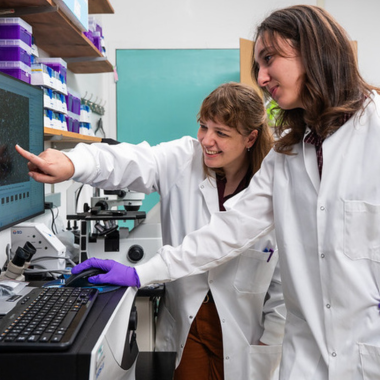Faculty Spotlight: Assistant Professor Melanie Balbach
The Department of Biochemistry and Molecular Biology (BMB) is thrilled to welcome Assistant Professor Melanie Balbach, who joined BMB in August 2023. Balbach brings with her an expertise in reproductive physiology, and specifically, sperm metabolism.
Originally from Germany, Balbach completed her Ph.D. at the Center of Advanced European Studies and Research in Bonn, a Max Planck Institute. It was here she began her work on sperm physiology—critical research that’ll continue at MSU as her lab explores the fundamental nature of the immense metabolic changes occurring in mammalian sperm as they swim toward the oocyte, as well as the regulatory and signaling pathways that underlie this process.

Balbach’s examination of sperm metabolism carries the potential for huge breakthroughs in the realms of reproductive health and culture. With almost one in six individuals globally believed to be impacted by infertility, many are faced with idiopathic infertility—a condition whose root cause remains unexplained even after extensive medical testing. For men, this might manifest in an infertility diagnosis even with an otherwise healthy sperm count. Here, Balbach sees the analysis of metabolism as an especially promising research direction.
“The amount of adenosine triphosphate (ATP) generated by sperm is massive, and if this process somehow doesn’t work, the sperm won’t swim anywhere,” Balbach explained. “One really great way to improve assisted fertility techniques is to improve our diagnosis of infertility patients. Metabolism is one key area that’s often overlooked.”
In addition to tackling questions of fundamental biochemistry, Balbach’s lab will also pursue a potentially world-changing discovery she was part of as a postdoctoral researcher at Weill Cornell Medicine in New York City—one that could help lead to an effective male contraceptive.
Traditionally, the development of male contraceptives has focused on blocking sperm at their creation—or spermatogenesis—rather than mature sperm. This approach however comes with numerous drawbacks: the process of becoming infertile is far from on demand, with individuals needing weeks to lose or regain their fertility. Additionally, these contraceptives are commonly hormone-based, leading to many clinical trials being halted due to severe side effects.
Balbach discovered that with the inhibition of a crucial protein, mature mouse sperm had effectively lost motility and male mice became temporarily infertile. These early findings have opened the possibility for an inhibitor-based, non-hormonal method of contraception that’d allow for on-demand male infertility with little to no side effects.
“I’ve become really, really passionate about this,” Balbach said. “Right now, about 50% of all pregnancies are unplanned, and this would give men additional options and agency in their fertility. Likewise, it creates freedom for those using female birth control, which is hormone-based and highly prone to side effects.”
As the Balbach lab strikes a balance between foundational and translational science, she’s excited to join a university and department tailor-made to support pioneering biochemistry.
“When I applied to MSU, I was drawn by its strong metabolism science background, as well as the world-class Mass Spectrometry and Metabolomics Core Facilities. You can do basic biochemistry just about anywhere, but to have these instruments on hand and the experts who maintain them, it’s very important.”
Balbach is likewise looking forward to taking advantage of MSU’s excellent reproductive and animal science programs. As her lab begins its work on human and mammalian sperm, they’re considering possible future expansion into new species—bovine sperm and even nonmammalian subjects that fertilize in external environments like seawater, thus presenting unique metabolic challenges.
“I’d really like to explore these mechanisms from an evolutionary perspective. Our lab will be exploring crucial, basic biochemical questions, and then the translation science of a male contraceptive—that's the cherry on top.”
To learn more about Professor Balbach’s ongoing research and the latest news, you can visit her lab website. The Balbach Lab is also currently recruiting an exceptional postdoc, with an application available on MSU Careers.



